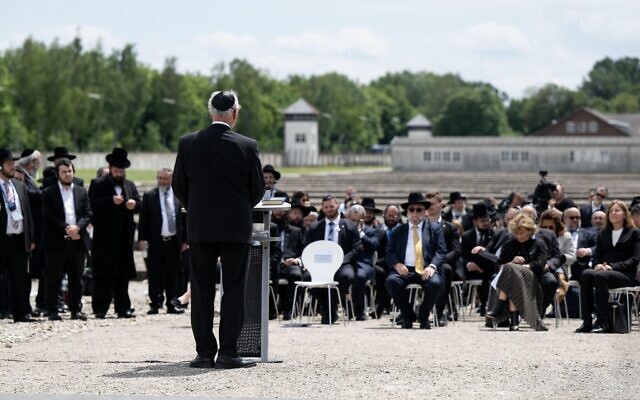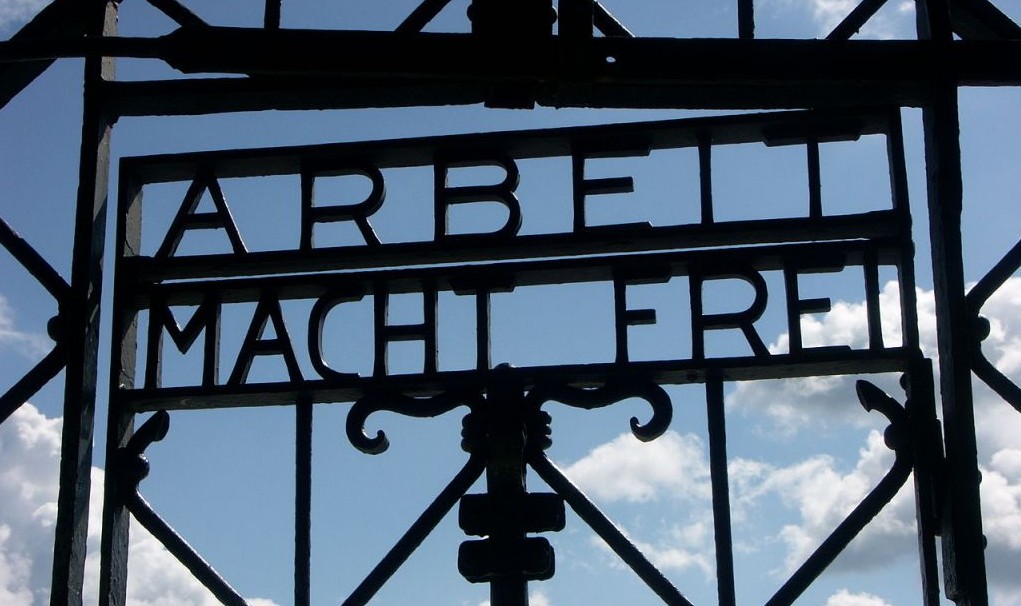Emotional Dachau ceremony acknowledges ‘the slow repair of Jewish life in Germany’
Conference of European Rabbis made infamous Nazi camp outside Munich the last stage of a three-day programme.

It was the first concentration camp, Hitler’s model for other such camps, and the only one that lasted throughout the 12 years of the Nazi regime. And its name, Dachau, still reverberates as a byword for oppression, torture and murder.
It was therefore fitting that the delegates to the Conference of European Rabbis made Dachau the last stage of their three-day programme — and for the German officials present, a profoundly intense and emotional way of acknowledging the slow repair of Jewish life in Germany.
For many it was a shock to realise that Dachau is a real place, a town near the camp itself, where people are continuing their normal lives. The immediate response was to wonder if the local people of the 1930s and 40s had gone about their own normal lives with the concentration camp on their doorstep.
Today Dachau is a vast empty space, with a menorah-topped memorial in one area, full of flickering candles and tributes to those who died there at Nazi hands. You approach it by walking past huge pits of graves, and through a panelled metal gate, which seems decorative until you see the chilling and familiar slogan, Arbeit macht frei, the cynical line that “Work makes you free”.
In a brief ceremony, the CER rabbis were welcomed by Dr Gabrielle Hammerman, the camp’s site director, and addressed by the Bavarian minister of the interior, Joachim Hermann. Mr Hermann, in an emotional speech, recalled the liberation of Dachau by the US Army, describing it as “a place of horror which fills us with shame”.
But he noted the re-emergence of the Munich Jewish community, which re-established a magnificent synagogue and community centre in the heart of the city in 2007, and said that he was “deeply grateful for the fact that Jews have found a home in our country”.
Mr Hermann deplored the “intolerable distortion” relating to anti-Ukrainian propaganda and blame for Covid, both issues which implicated Jews. He insisted he would do everything he could to stamp out antisemitism in Bavaria and told the rabbis: “This is not mere lip service”.
Charlotte Knobloch, herself a Holocaust survivor and now the president of the Israelite Religious Community of Munich and Upper Bavaria, said that for her community it had been “so important to have the rabbis here. I would not have expected the CER to be here, in the place where the cruelties started”. And she vowed: “Our light will not be concealed, not again, never again”.
The ceremony concluded with a siyum from Rabbi Jacquy Sebag of the Neve Shalom Synagogue in Casablanca and a memorial prayer and kaddish.

Thank you for helping to make Jewish News the leading source of news and opinion for the UK Jewish community. Today we're asking for your invaluable help to continue putting our community first in everything we do.
For as little as £5 a month you can help sustain the vital work we do in celebrating and standing up for Jewish life in Britain.
Jewish News holds our community together and keeps us connected. Like a synagogue, it’s where people turn to feel part of something bigger. It also proudly shows the rest of Britain the vibrancy and rich culture of modern Jewish life.
You can make a quick and easy one-off or monthly contribution of £5, £10, £20 or any other sum you’re comfortable with.
100% of your donation will help us continue celebrating our community, in all its dynamic diversity...
Engaging
Being a community platform means so much more than producing a newspaper and website. One of our proudest roles is media partnering with our invaluable charities to amplify the outstanding work they do to help us all.
Celebrating
There’s no shortage of oys in the world but Jewish News takes every opportunity to celebrate the joys too, through projects like Night of Heroes, 40 Under 40 and other compelling countdowns that make the community kvell with pride.
Pioneering
In the first collaboration between media outlets from different faiths, Jewish News worked with British Muslim TV and Church Times to produce a list of young activists leading the way on interfaith understanding.
Campaigning
Royal Mail issued a stamp honouring Holocaust hero Sir Nicholas Winton after a Jewish News campaign attracted more than 100,000 backers. Jewish Newsalso produces special editions of the paper highlighting pressing issues including mental health and Holocaust remembrance.
Easy access
In an age when news is readily accessible, Jewish News provides high-quality content free online and offline, removing any financial barriers to connecting people.
Voice of our community to wider society
The Jewish News team regularly appears on TV, radio and on the pages of the national press to comment on stories about the Jewish community. Easy access to the paper on the streets of London also means Jewish News provides an invaluable window into the community for the country at large.
We hope you agree all this is worth preserving.






















